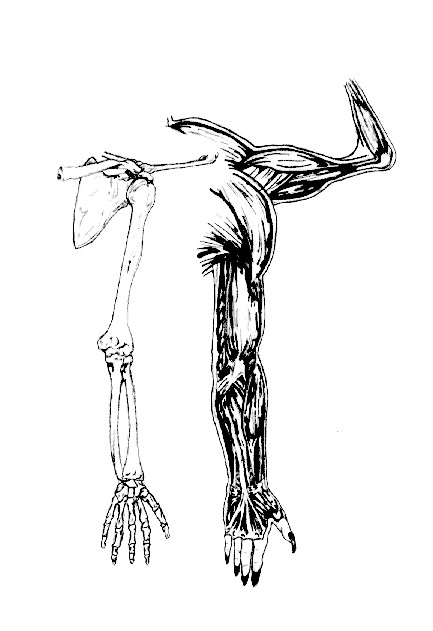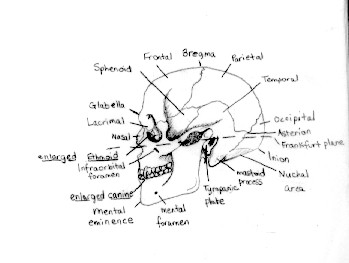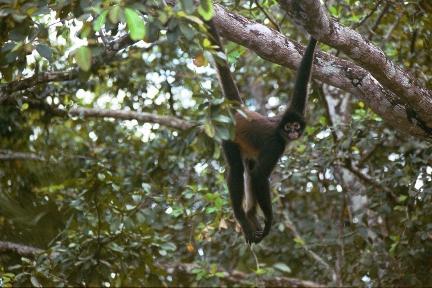Anatomy of the Yumbrabaul
 These drawings
show the left arm of a typical small Yumbrabaul still capable of flight.
Note the heavily muscled area near the shoulder, especially where the wing
juts out from the arm. A larger Yumbrabaul would have more densely
muscled arms while the muscle near the wings would atrophy from disuse.
The bones are more hollow in the small Yumbrabaul. The smaller Yumbrabaul
prefer lighter bones which facilitate flight (and hunting of the Khuy
Thaough who can fly with their wings), while the larger Yumbrabaul
prefer more dense bones that are less likely to break during a fight with
a Thaough.
These drawings
show the left arm of a typical small Yumbrabaul still capable of flight.
Note the heavily muscled area near the shoulder, especially where the wing
juts out from the arm. A larger Yumbrabaul would have more densely
muscled arms while the muscle near the wings would atrophy from disuse.
The bones are more hollow in the small Yumbrabaul. The smaller Yumbrabaul
prefer lighter bones which facilitate flight (and hunting of the Khuy
Thaough who can fly with their wings), while the larger Yumbrabaul
prefer more dense bones that are less likely to break during a fight with
a Thaough.

This drawing shows the skull of a small Yumbrabaul that has not developed
antlers. Particular attention should be paid to the enlarged canine,
which is a typical trait of carnivorous species. Examination of this
skull shows us that it probably belonged to a mature Yumbrabaul still capable
of flight. Juvenile Yumbrabaul do not develop the enlarged canine,
and had this skull belonged to a large Yumbrabaul it would have probably
had antlers for defense. The enlarged ethnoid, or ocular cavity,
has evolved in order to provide the Yumbrabaul with better vision to spot
both predators and prey.
 The Yumbrabaul
reproduce by laying eggs. A female will usually lay between one and
three eggs. After an average time of 4 months the young hatch and
are cared for by both parents with the aid of the whole pack. The
young Yumbrabaul breast feed for 5 months before they begin to eat solid
food. The small Yumbrabaul will not taste a Khuy Thaough until they
are able to catch one. The large Yumbrabaul will not taste a Khuy
Thaough until they have helped defend the pack from an attack by the
Thaough.
This could be because the adults are loath to part with their favorite
food. If the Yumbrabaul are sentient it could be that they do not
want to hinder the physical development of their young by over stimulating
them with dopamine.
The Yumbrabaul
reproduce by laying eggs. A female will usually lay between one and
three eggs. After an average time of 4 months the young hatch and
are cared for by both parents with the aid of the whole pack. The
young Yumbrabaul breast feed for 5 months before they begin to eat solid
food. The small Yumbrabaul will not taste a Khuy Thaough until they
are able to catch one. The large Yumbrabaul will not taste a Khuy
Thaough until they have helped defend the pack from an attack by the
Thaough.
This could be because the adults are loath to part with their favorite
food. If the Yumbrabaul are sentient it could be that they do not
want to hinder the physical development of their young by over stimulating
them with dopamine.
The Yumbrabaul all have; fur covering their bodies, a prehensile
tail, claws, enlarged ethnoids, and enlarged canines. All mature
Yumbrabaul have antlers to some extent although the large Yumbrabaul have
much more extensive antlers with many more points.
The ultimate question is "Are the Yumbrabaul sentient?"
If they are sentient then they own the rights to their planet and their
permission must be attained before any minerals can be mined or anyone
can settle on the planet. Click here
for the latest findings on whether or not the Yumbrabaul are sentient.
 This
is a photo of a spider monkey using its prehensile tail to hold
onto a tree branch. Prehensile tails are used both for balance and
grasping. They are normally found in tree dwelling creatures.
This
is a photo of a spider monkey using its prehensile tail to hold
onto a tree branch. Prehensile tails are used both for balance and
grasping. They are normally found in tree dwelling creatures.
Back to Main Page Khuy
Thaough Glossary
 These drawings
show the left arm of a typical small Yumbrabaul still capable of flight.
Note the heavily muscled area near the shoulder, especially where the wing
juts out from the arm. A larger Yumbrabaul would have more densely
muscled arms while the muscle near the wings would atrophy from disuse.
The bones are more hollow in the small Yumbrabaul. The smaller Yumbrabaul
prefer lighter bones which facilitate flight (and hunting of the Khuy
Thaough who can fly with their wings), while the larger Yumbrabaul
prefer more dense bones that are less likely to break during a fight with
a Thaough.
These drawings
show the left arm of a typical small Yumbrabaul still capable of flight.
Note the heavily muscled area near the shoulder, especially where the wing
juts out from the arm. A larger Yumbrabaul would have more densely
muscled arms while the muscle near the wings would atrophy from disuse.
The bones are more hollow in the small Yumbrabaul. The smaller Yumbrabaul
prefer lighter bones which facilitate flight (and hunting of the Khuy
Thaough who can fly with their wings), while the larger Yumbrabaul
prefer more dense bones that are less likely to break during a fight with
a Thaough.

 The Yumbrabaul
reproduce by laying eggs. A female will usually lay between one and
three eggs. After an average time of 4 months the young hatch and
are cared for by both parents with the aid of the whole pack. The
young Yumbrabaul breast feed for 5 months before they begin to eat solid
food. The small Yumbrabaul will not taste a Khuy Thaough until they
are able to catch one. The large Yumbrabaul will not taste a
The Yumbrabaul
reproduce by laying eggs. A female will usually lay between one and
three eggs. After an average time of 4 months the young hatch and
are cared for by both parents with the aid of the whole pack. The
young Yumbrabaul breast feed for 5 months before they begin to eat solid
food. The small Yumbrabaul will not taste a Khuy Thaough until they
are able to catch one. The large Yumbrabaul will not taste a  This
is a photo of a spider monkey using its prehensile tail to hold
onto a tree branch. Prehensile tails are used both for balance and
grasping. They are normally found in tree dwelling creatures.
This
is a photo of a spider monkey using its prehensile tail to hold
onto a tree branch. Prehensile tails are used both for balance and
grasping. They are normally found in tree dwelling creatures.